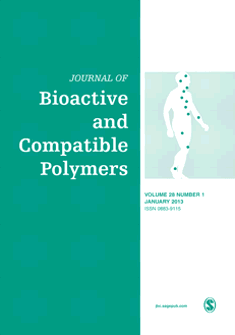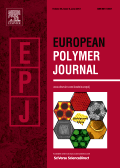
JOURNAL OF BIOACTIVE AND COMPATIBLE POLYMERS
metrics 2024
Shaping Tomorrow's Technologies with Polymer Insights
Introduction
JOURNAL OF BIOACTIVE AND COMPATIBLE POLYMERS, published by SAGE PUBLICATIONS LTD, serves as a pivotal platform for disseminating innovative research in the fields of bioengineering, biomaterials, materials chemistry, and polymers. With an ISSN of 0883-9115 and an E-ISSN of 1530-8030, this journal is committed to the advancement of knowledge relating to the interaction of polymers within biological systems and their compatibility in various applications. Operating since 1986, the journal has garnered a respectable presence, ranked in the Q3 quartile across multiple categories in 2023, indicating its relevance and contribution to these dynamic fields. Although not open access, the journal ensures that high-quality research is accessible to subscribers and institutions, reinforcing its importance for researchers, professionals, and students aiming to stay abreast of advancements in polymer science and biocompatibility. By fostering interdisciplinary communication and collaboration, the JOURNAL OF BIOACTIVE AND COMPATIBLE POLYMERS continues to play a crucial role in shaping the future of material applications in health, technology, and industry.
Metrics 2024
 0.35
0.35 2.10
2.10 2.10
2.10 56
56Metrics History
Rank 2024
Scopus
IF (Web Of Science)
JCI (Web Of Science)
Quartile History
Similar Journals

ACS Macro Letters
Unleashing the Potential of Polymers and PlasticsACS Macro Letters, published by the American Chemical Society, is a leading journal in the fields of Inorganic Chemistry, Materials Chemistry, Organic Chemistry, and Polymers and Plastics. Established in 2012, this journal has swiftly ascended to the forefront of chemical research with an impressive reputation, as evidenced by its 2023 Scopus rankings placing it in the first quartile across multiple categories. The journal's objective is to disseminate timely and concise articles that advance the study of macromolecules and their applications, making it an essential resource for researchers, professionals, and students alike. With a focus on fostering innovation and facilitating collaboration within the chemical community, ACS Macro Letters presents a robust platform for scientists to share their groundbreaking findings. Being based in the United States, it serves as a central hub for global discourse in the chemical sciences, although it does not currently offer Open Access options. The journal's commitment to high-quality content is further underscored by its prestigious impact factor and acceptance into elite academic quartiles, signifying its influence and importance in shaping future research.

REACTIVE & FUNCTIONAL POLYMERS
Connecting Scientists to Transform Polymer ScienceREACTIVE & FUNCTIONAL POLYMERS, published by Elsevier, is a leading journal in the field of polymer science, focusing on the innovative development and application of reactive and functional polymers. With an impressive impact demonstrated through its classification in various prestigious categories, including Q1 rankings in Chemical Engineering, Chemistry, and Materials Chemistry, this journal serves as an essential resource for researchers and professionals seeking to explore the latest advances in polymer research. With a broad scope that encompasses topics from biochemistry to environmental chemistry, and a convergence of significant findings from 1995 to 2024, REACTIVE & FUNCTIONAL POLYMERS fosters academic dialogue and collaboration among scientists. The journal also features Open Access options, ensuring that groundbreaking research is readily available to a global audience. By consistently publishing high-quality articles, it not only enriches the scientific community but also drives innovation across various industries reliant on polymer technologies.

JOURNAL OF BIOMATERIALS SCIENCE-POLYMER EDITION
Transforming biomedical applications with cutting-edge biomaterials.JOURNAL OF BIOMATERIALS SCIENCE-POLYMER EDITION, published by Taylor & Francis Ltd, is a distinguished scholarly journal dedicated to the exploration of biomaterials and their applications in various fields such as bioengineering, biomedical engineering, and biophysics. With an ISSN of 0920-5063 and an E-ISSN of 1568-5624, this journal offers a platform for researchers and professionals to share innovative findings and methodologies that advance the science of polymer-based biomaterials. The journal's impact within the academic community is underscored by its notable Scopus rankings, including a Q2 status in both Biomedical Engineering and Biophysics as of 2023, reflecting its significant contribution to advancing knowledge and practice in these fields. The scope of the journal spans from fundamental research to applications in medical devices and regenerative medicine, ensuring comprehensive coverage of the latest trends and breakthroughs. Although it does not currently offer open access options, the journal remains a pivotal resource for students, researchers, and professionals committed to the development and application of biomaterials in healthcare. For further details, the journal is based in Abingdon, United Kingdom, at 2-4 Park Square, Milton Park, OX14 4RN.

MACROMOLECULAR RESEARCH
Unlocking the Potential of Polymers WorldwideMACROMOLECULAR RESEARCH, published by the POLYMER SOC KOREA, is a premier journal dedicated to advancing the field of macromolecular science and polymer engineering. With its ISSN 1598-5032 and E-ISSN 2092-7673, this journal has emerged as a vital platform for researchers and professionals interested in the application and development of polymers across various domains. Based in South Korea and operating as an open-access resource since its inception in 2002, MACROMOLECULAR RESEARCH consistently ranks in the Q2 category across diverse fields such as Chemical Engineering, Materials Chemistry, and Organic Chemistry as per the latest 2023 metrics. Notably, it is recognized for its substantial contributions to polymery science, increasing its visibility and impact in global research. By providing a forum for original research articles, reviews, and innovative methodologies, this journal aims to foster collaboration and knowledge sharing among scientists, engineers, and students alike. Join a community that is at the forefront of polymer research by exploring the wealth of resources and cutting-edge studies featured in MACROMOLECULAR RESEARCH.

MOLECULES
Unleashing Potential in Analytical and Pharmaceutical SciencesMOLECULES, published by MDPI, stands as a prominent open-access journal dedicated to the field of chemistry, with an exceptional reputation in various sub-disciplines. Since its inception in 1997, this journal has committed itself to the dissemination of innovative research, spanning topics in Analytical Chemistry, Organic Chemistry, Pharmaceutical Science, and Drug Discovery. With impressive rankings across Scopus categories—including a coveted Q1 designation in both Analytical Chemistry and Pharmaceutical Science—MOLECULES is recognized as a vital resource for researchers, professionals, and students aiming to stay at the forefront of scientific development. The journal’s data reflect its wide-ranging influence, holding high percentiles in multiple chemistry categories, thereby ensuring that its articles reach a significant audience. As an open-access journal, it provides unparalleled access to its content, available freely and globally, which promotes further advancement and collaboration within the scientific community. Its ongoing commitment to high-quality research from 1996 to 2024 reinforces its status as a leader in the academic publishing landscape.

EUROPEAN POLYMER JOURNAL
Innovating Materials Chemistry for a Sustainable FutureEUROPEAN POLYMER JOURNAL is a leading academic journal published by PERGAMON-ELSEVIER SCIENCE LTD, dedicated to advancing the field of polymer science and engineering. With a distinguished history since 1965, this journal serves as a critical platform for researchers to disseminate high-quality research findings within a broad scope that encompasses materials chemistry, organic chemistry, and physics. The journal boasts an impressive Q1 category ranking in multiple fields, including Materials Chemistry, Organic Chemistry, and Polymers and Plastics, placing it in the top tier of academic journals worldwide. Its standing is further reinforced by its high citation metrics, with ranks such as #16 in Organic Chemistry and #20 in Polymers and Plastics, reflecting its significant contribution to the advancement of knowledge and innovation in these areas. Although currently not available as an open-access journal, it provides subscribers with in-depth studies, reviews, and insights relevant to both academia and industry. Researchers, professionals, and students alike will find invaluable information and emerging trends in polymer research, making the EUROPEAN POLYMER JOURNAL an essential resource for staying at the forefront of this dynamic and evolving field.

Polymer-Plastics Technology and Materials
Championing Open Access in Material AdvancementsPolymer-Plastics Technology and Materials is a premier academic journal published by Taylor & Francis Inc., dedicated to the dynamic fields of chemical engineering, materials chemistry, and polymers and plastics. With an impact factor that reinforces its reputation, this journal is strategically indexed in Scopus, ranked notably within its categories (Q2), showcasing its influence and relevance in the academic community. Since its inception in 2019, the journal has served as an essential platform for researchers, professionals, and students to disseminate innovative studies and advancements in polymer science and materials technology. As an Open Access publication, it ensures that cutting-edge research is accessible to a global audience, fostering collaboration and knowledge sharing in the material sciences. Located in the United Kingdom, Polymer-Plastics Technology and Materials continues to enhance the dialogue within the industry, addressing critical challenges and exploring emerging trends that shape the future of polymer and plastics technologies.

ACS Materials Au
Showcasing the Best in Biomaterials and BeyondACS Materials Au, published by the American Chemical Society, is a premier open-access journal that has been at the forefront of materials science since its inception in 2021. With an ISSN of 2694-2461, this journal encompasses an expansive range of topics including biomaterials, electronic, optical and magnetic materials, materials chemistry, and polymers and plastics, consistently achieving Q1 rankings in these categories for 2023. The journal is based in the United States and operates from the AMS's headquarters in Washington, DC, offering significant visibility and a robust platform for researchers. The journal's commitment to open access ensures wide dissemination of groundbreaking research, enabling a diverse audience—including researchers, professionals, and students—to engage with the latest advancements in materials science. With an encouraging impact factor and a focus on novel materials and innovative applications, ACS Materials Au stands as a vital resource for anyone devoted to understanding and advancing the frontiers of materials engineering and science.

Polymers
Exploring the forefront of materials innovation.Polymers is a premier journal published by MDPI, dedicated to advancing the field of polymer science and technology. This open-access journal, established in 2009, has quickly gained prominence in the academic community, serving as a vital platform for disseminating high-quality research articles, reviews, and communications in the realms of chemistry, polymers, and plastics. Based in Switzerland, with an impressive ranking in the Q1 quartile for both Chemistry and Polymer studies, Polymers boasts a significant impact factor, reflecting its rigorous peer-review process and esteemed editorial board. Researchers, professionals, and students alike benefit from the broad accessibility of content, allowing for a more extensive reach and engagement within the scientific community. As a key resource for the latest advancements and innovations in polymer research, Polymers continues to lead discussions, inspire collaborations, and foster the development of novel materials that shape various industrial applications.

POLYMER INTERNATIONAL
Exploring the Frontiers of Material ChemistryPOLYMER INTERNATIONAL is a leading journal in the field of polymer science, published by Wiley, one of the most esteemed scholarly publishers. With an ISSN of 0959-8103 and an E-ISSN of 1097-0126, this journal has been a pivotal platform for researchers since its inception in 1991, now extending its coverage until 2024. The journal boasts a commendable standing in various scientific domains, achieving a Q2 quartile ranking in Materials Chemistry, Organic Chemistry, and Polymers and Plastics as of 2023. Additionally, it holds impressive Scopus ranks, including Rank #47 in Organic Chemistry and Rank #40 in Polymers and Plastics, placing it within the top percentiles of its categories. Researchers, professionals, and students alike can benefit from its rich array of articles that contribute to the understanding and advancement of polymer technology and materials science. Although not an open access journal, POLYMER INTERNATIONAL remains crucial for disseminating high-quality research that drives innovation and development within the field.